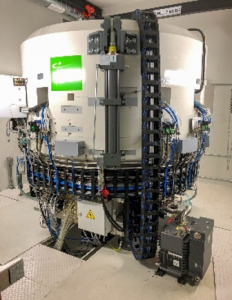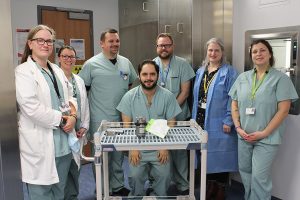Radiopharmaceutical sciences (RPS)
What we do

The radiopharmaceutical sciences team is responsible for manufacturing medical isotopes and radiopharmaceuticals through the use of a cyclotron (particle accelerator).
Medical isotopes and radiopharmaceuticals are man-made radioactive materials that are chosen specifically for their ability to help diagnose disease and subsequently determine the appropriate treatment.
Medical isotopes
The cyclotron allows for the in-house production of medical isotopes that cannot be imported. These medical isotopes are selected according to the types of radiation they emit and the length of time they stay in the body to optimize the predictive power of the diagnostic imaging while minimizing patient radiation exposure (lower than a CT-scan).
The goal of the radiopharmaceutical sciences team is to make medical isotopes available to the population of Newfoundland and Labrador and allow for improved disease management and treatment outcome.
Radiopharmaceuticals

Once the medical isotopes have been produced, they must be processed into a medically useful product appropriate for use in patients. During this process, the medical radioactive isotope atoms are incorporated into organic molecules to create radioactive tracers called radiopharmaceuticals.
There is an extensive list of existing radiopharmaceuticals used to diagnose/stage a large variety of diseases, such as cancers, neurodegenerative diseases and cardiac disorders.
The goal of the radiopharmaceutical sciences team is to make medical isotopes available to the population of Newfoundland and Labrador and allow for improved disease management and treatment outcome.
One of the most commonly used radiopharmaceutical is 18F-fluorodeoxyglucose, generally referred to as FDG or 18F-FDG for cancer diagnostic.
Safety
To ensure that the radiopharmaceuticals produced are of the highest quality and are safe, extensive quality control testing occurs on the radiopharmaceutical before it may be used on patients.
An extensive quality assurance program has also been developed and implemented to ensure that all tasks performed meet federal regulations; as such, all activities are thoroughly documented, reviewed, and scrutinized to always ensure quality and safety within our facility.
Regulation
As radiopharmaceutical sciences produces radioactive materials, the facility requires authorization from the Canadian Nuclear Safety Commission (CNSC). These extensive regulatory processes must be followed during the construction of the facility, the installation of the cyclotron and during operation. Following authorization to operate, the CNSC periodically audits the facility to ensure it is following the guidelines and is operating safely.

In addition, the radiopharmaceuticals prepared at the facility are regulated by Health Canada providing oversight of the manufacturing and quality of the medical isotopes and radiopharmaceuticals produced onsite.
Finally, in addition to federal regulatory agencies oversight, the Radiopharmaceutical Sciences Program has attracted highly qualified experts (i.e. cyclotron engineer, medical physicist, radiochemist, radiopharmacists, quality assurance professional and technologists) who are committed to providing a safe and quality service.
